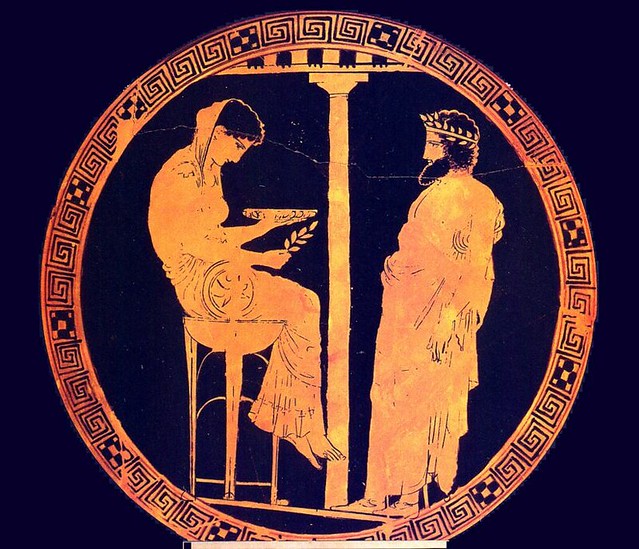“I find it relevant to quote here a formulation devised by Dio of Prusa (‘Dio Chrysostom’), a Greek thinker who lived in a period straddling the first and the second centuries CE. In what I am about to quote, taken from his Olympic Discourse (Oration 12), Dio is representing a hypothetical speech delivered by none other than the great sculptor Pheidias of Athens, who is speaking about his masterpiece, the colossal statue of Zeus that he sculpted for the temple of Zeus at Olympia in Elis. In the passage I will be quoting, Pheidias explains his idealizing of the human form in creating the spectacular statue of Olympian Zeus. To justify the idealized human form that he creates for Zeus, the sculptor speaks about a universal need felt by humans not only to imagine gods as existing in the sky or in the cosmos in general but also to have a feeling of divine immediacy by being physically near them, close to them – a feeling achieved by way of mental or even physical contact with statues and with paintings and with other images of the gods:
‘Because of their attraction to the divine unknown [daimonion], all humans have a powerful erotic desire [erōs] to worship … and to take care of [therapeuein] the divinity [theion] that they do know, by being up close to it and near to it, as they approach it and try to touch it in an act of persuasion, and they sacrifice to it and offer it garlands. Quite simply, they are like disconnected … children who have been torn away from their father or mother and who, feeling a terrific urge … and longing [pothos], often reach out their hands while they are dreaming, in the direction of their parents who are not there, so also are humans in their relationship with the gods, loving them as they do, and justifiably so, because the gods do good things for them and have an affinity with them. And, in their love for the gods, humans strive in all possible ways to be with them and in their company.’
(This word daimonion is derived from daimōn, which refers to an unspecified god, whereas theos refers to a specific god)”
Gregory Nagy, “Ancient Greek Hero in 24 Hours,” Kindle edition

"The deepest core of life is poetry and symbol." - Dane Rudhyar
Like Symbol Reader on Facebook
-
-
Recent Posts
Categories
Archives
Meta













….and so are these gods attracted to us!
LikeLiked by 1 person
Indeed!
Thank you very much, Judith.
LikeLike
This very much strikes home for me. I am at the core a Taoist; the ultimate divine is formless and without personality, but it also informs everything that exists. I have an altar in spite of (and perhaps because of) that, and on it are images of Kuan Yin, Maman Brigitte, and various shamanic allies. It isn’t a place of worship precisely, but of contact and connection with beings that in my experience are connected to the Tao more deeply and intensely than I am.
LikeLiked by 2 people
Exactly. So beautifully and aptly put. Thank you.
LikeLike
Reblogged this on lampmagician.
LikeLike
I love this write and your perspective !
LikeLiked by 1 person
Thank you as usual!
LikeLiked by 1 person
Helps one to understand things one is experiencing. Thank you.
LikeLiked by 1 person
Always great to hear from you.
Thank you.
LikeLike
Interesting. Wonder whether the word has been interpreted as “demon” in places. I read foot notes in the Bible that said the word that was translated as demon literally translates into “spirit of the air.” Gives a completely different meaning.
LikeLiked by 1 person
Really interesting! – you know I am mad about etymology. 😉
LikeLiked by 1 person
The Divine Source calls for all of us to awaken from our slumber of ignorant belief of ‘separateness’. Separateness is an ILLUSION that we humans have been taught – separateness from the plants and animals and stars and planets – and yes, even separate from God!
LikeLike
And yet the one and only truth is that we are not separate.
Thank you for a thoughtful comment.
LikeLike